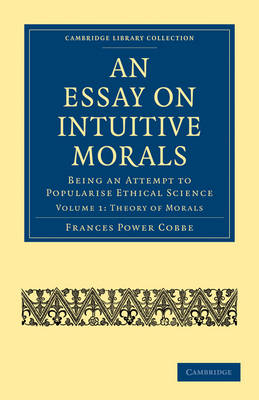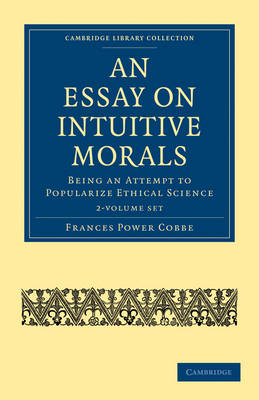Cambridge Library Collection - Philosophy
1 primary work • 4 total works
Volume 1
Frances Power Cobbe (1822–1904) was an Irish writer, social reformer and activist best known for her contributions to Victorian feminism and women's suffrage. After the death of her father in 1857, Cobbe travelled extensively across Europe before becoming a leader-writer addressing public issues for the London newspaper The Echo in 1868. She continued to publish on the topics of feminism, social problems and theology for the rest of her life. These volumes, first published anonymously in 1855, introduced Cobbe's theistic religious beliefs, which blend a belief in Divinity with Immanuel Kant's idea of freedom of will, in which a person's moral imperative is independent of outside authority and provides proof of the existence of God. Cobbe discusses Kant's moral philosophy, explaining the religious beliefs which formed the basis for her later discussions of Christianity. Volume 1 contains her ideas on the origin of morality.
Frances Power Cobbe (1822-1904) was an Irish writer, social reformer and activist best known for her contributions to Victorian feminism and women's suffrage. After the death of her father in 1857, Cobbe travelled extensively across Europe before becoming a leader-writer addressing public issues for the London newspaper The Echo in 1868. She continued to publish on the topics of feminism, social problems and theology for the rest of her life. These volumes, first published anonymously in 1855, introduced Cobbe's theistic religious beliefs, which blend a belief in Divinity with Immanuel Kant's idea of freedom of will, in which a person's moral imperative is independent of outside authority and provides proof of the existence of God. Cobbe discusses Kant's moral philosophy, explaining the religious beliefs which formed the basis for her later discussions of Christianity.
An Essay on Intuitive Morals: Volume 1, Theory of Morals
by Frances Power Cobbe
Published 5 August 2011
Frances Power Cobbe (1822-1904) was an Irish writer, social reformer and activist best known for her contributions to Victorian feminism and women's suffrage. After the death of her father in 1857, Cobbe travelled extensively across Europe before becoming a leader-writer addressing public issues for the London newspaper The Echo in 1868. She continued to publish on the topics of feminism, social problems and theology for the rest of her life. These volumes, first published anonymously in 1855, introduced Cobbe's theistic religious beliefs, which blend a belief in Divinity with Immanuel Kant's idea of freedom of will, in which a person's moral imperative is independent of outside authority and provides proof of the existence of God. Cobbe discusses Kant's moral philosophy, explaining the religious beliefs which formed the basis for her later discussions of Christianity. Volume 1 contains her ideas on the origin of morality.
An Essay on Intuitive Morals: Volume 2, Practice of Morals
by Frances Power Cobbe
Published 5 August 2011
Frances Power Cobbe (1822-1904) was an Irish writer, social reformer and activist best known for her contributions to Victorian feminism and women's suffrage. After the death of her father in 1857, Cobbe travelled extensively across Europe before becoming a leader-writer addressing public issues for the London newspaper The Echo in 1868. She continued to publish on the topics of feminism, social problems and theology for the rest of her life. These volumes, first published anonymously in 1855, introduced Cobbe's theistic religious beliefs, which blend a belief in Divinity with Immanuel Kant's idea of freedom of will, in which a person's moral imperative is independent of outside authority and provides proof of the existence of God. Cobbe discusses Kant's moral philosophy, explaining the religious beliefs which formed the basis for her later discussions of Christianity. Volume 2 contains her ides on religious and moral duty.


